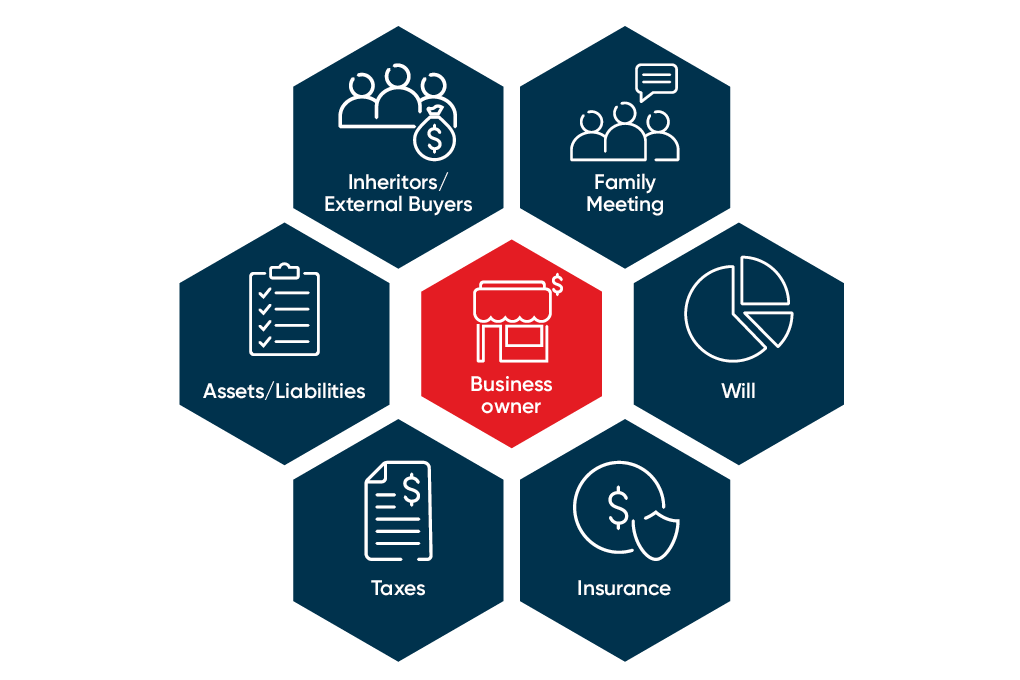The value of advice in family businesses
When it comes to planning a financial legacy, there is so much more to consider that goes far beyond the family tree. The role of the advisor is to take an assertive position in the conservation of wealth and defining the nature of the inheritance, whether that be purely financial or a business transference within the family or otherwise.
The financial legacy of family businesses requires thorough planning, regardless of how the handoff occurs. Remember, we’re talking about one trillion untouched dollars floating around in the Canadian family business ecosystem that could either be invested into bigger organizations or contribute to a very comfortable financial future. That said, the next steps in the legacy planning process would involve the following:
1. Shed light on the full picture: Advisors must educate their clients on how to establish a family business workflow (see Exhibit 1)1. The business owner looking to hand responsibility on to someone else must clearly determine how they want to do so. Advisors can lead the way by helping business owners run through the following tactics:
a. Setting specific criteria that the inheritors or buyers must meet;
b. Organizing conversations between the owner and their family to discuss the future of their company;
c. Identifying their intentions for their business in their will;
d. Identifying which assets, liabilities and types of insurance should be considered; and
e. Meeting with a tax specialist to discuss anticipated tax consequences and deductions.

Exhibit 1 (Source: FinancialTechTools.ca).
2. Build a family council board: Your clients will require a robust team of experts to build and implement the succession plan most likely to succeed. Advisors must equip themselves with an expert network including lawyers, accountants, trust officers, M&A specialists, and even family therapists for the not-so-smooth handoffs. These key actors will provide unbiased, impartial advice based on the business owner’s intentions and their family’s input. The financial advisor should act as the main point of contact for all members of the board, planning video conference calls regularly to ensure most if not all goals are met.
3. Establish a comfortable retirement plan: Now that business and family is taken care of, your client’s future retirement financial plan much be drawn up. How much will they need to live comfortably, and will they have enough money? As compared to other forms of retirement capital, business owners have had their assets tied up in their companies and may even lack adequate sources of wealth diversification. They may risk getting their businesses undervalued – since valuing a private business can be a gamble – or generally weakening their business if they need to extract retirement income at an inopportune moment of the business cycle. Before getting to a point where retirement decisions may result in family tension and frayed relationships, business owners are always encouraged to establish their retirement plan well before the moment they hand over the keys to the new owners.
The three pillars of establishing business legacy
Though a seamless family business takeover by a trusted entity is always the goal, not all transitions enjoy the fairy tale ending. An untimely death or serious illness, poorly communicated intentions resulting in silence treatments and disappointment, or unanticipated business decisions neglecting the needs of the whole family still remain possibilities. To try circumventing these undesirable outcomes, we refer to the three pillars of business legacy, as identified by Dr. Deans:
1. Ensure that all generations have similar visions for the business: Do the generations have similar visions for the future plans of the company? Advisors should ask highly specific questions that relate to intent and vision – this allows them to determine if the inheritors are employee-minded or owner-oriented.
2. Evaluate all business scenarios during the transition: Is the current owner willing to sell the business? Some scenarios can be destructive: the current owner semi-retires, spends time down south for half the year, then comes back to work full-time, driving the managing team crazy. Does the primary owner ever plan to relinquish full control to their children or inheritors? Or are they bound to provide unsolicited advice and stunt progress forever? Advisors should determine when and if the current owners would be willing to hand over the reins, and if so, to who.
3. Learn about the ins-and-outs of the business: Do the children or inheritors want to risk their capital to buy their family’s business? The truth of the matter is, nowadays, most don’t: the statistic of inheritors who do only hovers somewhere around 7%. In some cases, inheritors have put the family business in peril due to a lack of knowledge and resources, all caused by a deeply seeded sense of guilt and obligation. Advisors are tasked with finding the most appropriate successor to the business, whether they be part of the owner’s genealogical tree or not.
The legacy of legacy planning
Family business owners are coming to terms with the reality that they’re in violation of the first principle of sound financial planning: they’ve amassed their wealth into only one asset class. Advisors should encourage business owners to have the legacy conversation early, ensuring a seamless, peaceful transition and the continuity of their business’ success.
Start drafting your legacy planning conversations! Contact your NBI Sales Representative today.


